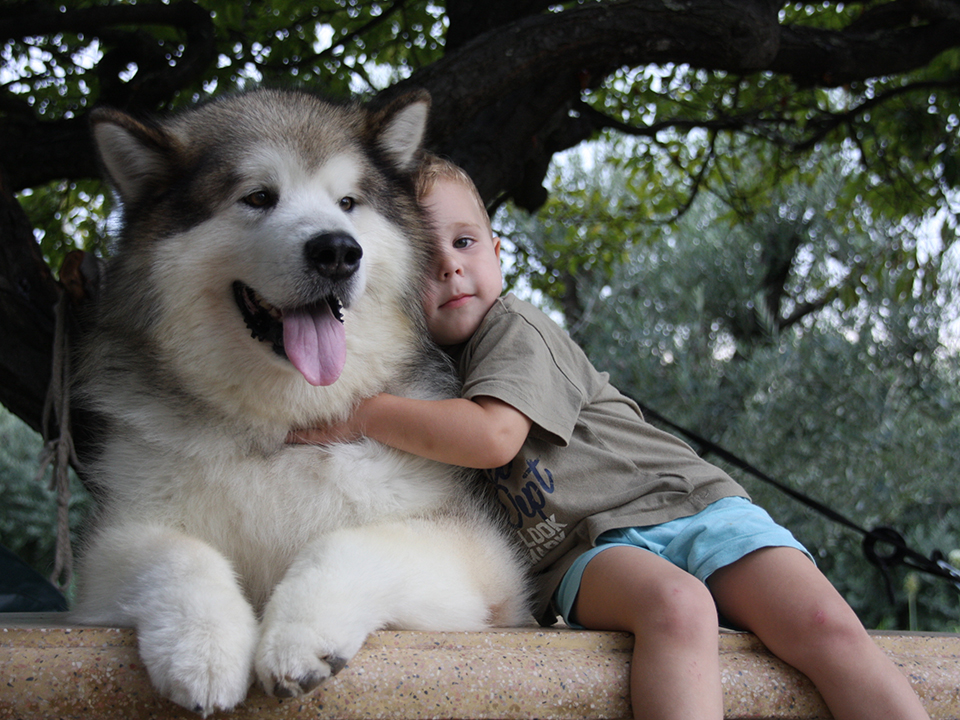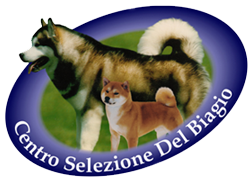
CHARACTER
The Alaskan Malamute is a dog that is difficult to talk about; you can't define it and capture the essence of the character in just a few lines. Only by living daily together, after some time you will understand and fully appreciate his great character qualities, as well as his aesthetic qualities. Ours is a strong and decisive and extremely intelligent dog, but above all with an unusual instinct, comparable to that of the wolf. These could only be the characteristics of a dog selected by nomadic tribes of Alaska - the Mahlemiuts, in environmental conditions to say the least prohibitive (cold, frost and fatigue). Natural selection exercised by man (the weakest and unsuitable dogs were suppressed) even if hard and cruel, it helped to create a dog of unmatched character: strong, powerful and resistant, but sweet and affectionate at the same time. Another interesting and peculiar aspect of the character of the Malamute is that it considers you as an element of its pack.
Therefore it will be your task to make him understand who the leader is, to whom he must obey; mind you, obedience, never unconditional submission. The Malamute always maintains its independence and autonomy. This attitude is rooted in the fact that when the Musher (conductor of sled) in the immense glacial expanses lost its orientation, he left the first dog of the team (called leader) to take him back to the camp. In this circumstance the man did not command the dog, but collaborated with it. This is the key to having a peaceful and harmonious coexistence: complicity is the only iron rule besides mutual respect. We set the rules of the game; then the dog moves, respecting them, but with its own autonomy.
This "decision-making capacity" leads him to not blindly execute the commands he deems useless. For example: if you repeatedly call your dog with the "come" command without a specific purpose, it will ignore you, not because it doesn't understand, but because its actions always have an end. The Malamute, although not excessively expansive and nagging, is certainly a very affectionate dog; it will be limited to small but expressive gestures, like taps to the hands with the muzzle or the simple greeting to our return. Being in the garden, he will settle in the area he prefers, only to keep an eye on our every move and move accordingly. The Alaskan is not brought to the defense of the territory and to the guard, but there are some exceptions that in any case confirm the rule. However, he may be able to discourage or intimidate strangers thanks to his impressive size.
The puppy you will bring home will surely be the most loving you know, but you cannot forget that it will become 40Kg of strength and tenacity. For this it will be good that from the earliest age you begin to socialize your Malamute in a wide variety of situations; this will make him really sure of himself and at the same time balanced and calm. It may happen that the Malamute, due to its strong and determined temperament, growls, for example towards other dogs; never let him do this and energetically discourage this instinct. Like people, each individual has its own peculiarities, but for the most part we are the owners who contribute to the formation of our dog's character.
It seems appropriate to remember that your dog, as much as you may like him, is not a person therefore not attributed to human feelings and needs. They have them of their own and specifications; our task is to understand them and fulfill them as much as possible. It is not part of the dog's needs to nibble on the sofa, even if it is a puppy and it is not good for him to let him do it. On the contrary, it is a requirement of his to be respected to have a place of his own available where no one (including children) goes to disturb him. Finally, I can say that the Malamute certainly needs space and motion, but even more than contact with its owner; if you leave him alone he will become sad and melancholy. If you don't have the time, the desire and the love to dedicate to him, I suggest you give up the most faithful friend of man.





